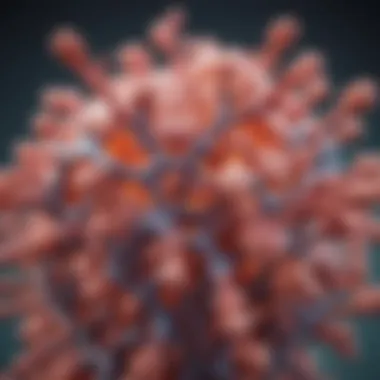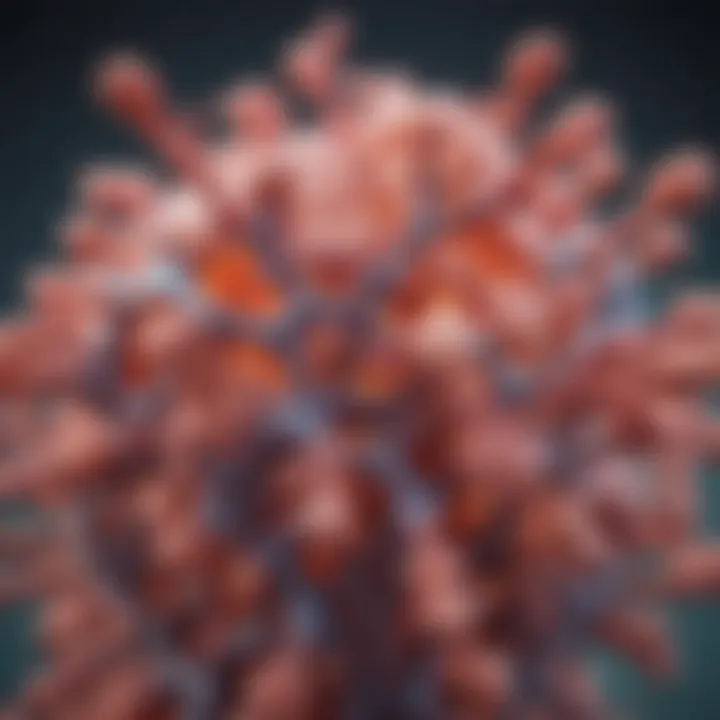Understanding the Phenylketonuria Gene and Mechanisms


Intro
Phenylketonuria is a genetic disorder that affects the metabolism of phenylalanine, an amino acid that plays a role in the development and function of the brain. It is crucial to comprehend the underlying gene, known as the PAH gene, to fully understand this disorder. The PAH gene is responsible for producing the enzyme phenylalanine hydroxylase. Without enough of this enzyme, phenylalanine accumulates in the body, leading to various health issues, especially neurological problems if not controlled.
As we explore the implications and mechanisms associated with the gene, we will delve into the mutations that disrupt its normal function, the biological consequences of these mutations, and the available diagnostic and treatment methodologies. This overview aims to equip students, researchers, and practitioners with essential insights into phenylketonuria, emphasizing the importance of managing this condition effectively.
Preface to Phenylketonuria
Phenylketonuria is a significant metabolic disorder that has implications for various aspects of health. Understanding this condition is essential for students, researchers, and healthcare professionals. It involves an inherited inability to metabolize the amino acid phenylalanine. While normal metabolism of phenylalanine is crucial for several bodily functions, the failure to do so can lead to serious health consequences. This section serves as a foundation for exploring other aspects of the disorder, such as its genetics, biological mechanisms, and clinical implications.
Overview of Phenylketonuria
Phenylketonuria, often abbreviated as PKU, is a genetic disorder that affects the body’s ability to break down phenylalanine. When an individual with PKU consumes foods high in phenylalanine, such as meat, eggs, and dairy products, the compound accumulates in the body. High levels of phenylalanine can lead to brain damage, intellectual disabilities, and other psychological issues if not managed properly. Early diagnosis and intervention are crucial to prevent these serious outcomes.
Historical Background
The understanding of phenylketonuria has evolved significantly since its discovery. The disorder was first identified in 1934 by Dr. Frederick W. Gowland Hopkins, who noted the unusual urine odor in affected individuals. In the 1960s, significant advances were made in diagnosing PKU through new testing methods. The introduction of newborn screening programs played a pivotal role in identifying affected infants, enabling early intervention. Today, ongoing research continues to explore the genetic underpinnings and develop new treatment strategies for this disorder.
Early intervention can significantly reduce the risk of severe cognitive impairment associated with high phenylalanine levels, emphasizing the need for effective screening.
Understanding the history and implications of phenylketonuria provides a context for the remaining sections of the article, guiding readers through the complexities of the associated genetics and clinical outcomes.
Genetics of Phenylketonuria
The genetics of phenylketonuria is a fundamental aspect of understanding this metabolic disorder. It revolves around the PAH gene, which is responsible for encoding the enzyme phenylalanine hydroxylase. When mutations occur within this gene, they can disrupt normal metabolic processes that convert phenylalanine into tyrosine. This disruption is significant because elevated levels of phenylalanine can be toxic to the brain and nervous system, leading to the characteristic symptoms of PKU.
By exploring the genetics of phenylketonuria, we can identify not only the mutations involved but also the ways these mutations affect individuals. Understanding these genetic underpinnings is crucial for both diagnosis and management. Diagnostic approaches often begin with genetic testing to determine whether a patient has mutations in the PAH gene, aiding in the timely treatment and intervention necessary for better outcomes.
The PAH Gene
The PAH gene is located on chromosome 12 and plays an essential role in the metabolism of phenylalanine. It encodes the enzyme responsible for converting phenylalanine to tyrosine. Tyrosine is not only important for protein synthesis but also serves as a precursor for neurotransmitters like dopamine, norepinephrine, and epinephrine.
When mutations in the PAH gene occur, they can result in a range of outcomes, from mild to severe forms of PKU. More than 600 mutations have been identified, which can lead to different enzyme activities. Some individuals may have residual enzyme function, allowing them to manage their condition with dietary restrictions, while others may require more intensive treatments.
Mutations and Polymorphisms
Mutations in the PAH gene vary greatly. These mutations can be classified into several categories, including missense, nonsense, deletion, and insertion mutations. Missense mutations replace one amino acid with another, potentially altering the enzyme's functionality. Nonsense mutations lead to premature termination of the protein, severely affecting its activity.
Polymorphisms are also of interest, as they may influence the risk of developing PKU or the severity of the disorder. They usually have a smaller effect compared to mutations, but can still provide valuable insights into personalized treatment. Understanding these genetic variations offers an opportunity for tailored interventions and closer monitoring for individuals at risk.
Inheritance Patterns
Phenylketonuria is inherited in an autosomal recessive manner. This means that both copies of the PAH gene must carry mutations for the individual to express the disorder. Therefore, parents who are carriers (typically, possessing one normal and one mutated copy of the gene) usually do not show symptoms but can pass on the mutation to children.
It's important to note that genetic counseling is advisable for families with a history of PKU. A genetic counselor can help assess risks and explain the implications of inherited mutations. Knowing the inheritance patterns can guide family planning and provide support for those affected by PKU.
Understanding the genetics of phenylketonuria provides critical insights that not only inform treatment but also enhance overall knowledge of metabolic disorders.
Biological Mechanisms


The term "Biological Mechanisms" refers to the intricate processes that dictate how the phenylketonuria gene impacts metabolism and overall health. Understanding these mechanisms is crucial for grasping how phenylketonuria manifests in individuals and the subsequent clinical implications. By examining these biological components, readers gain insights into the complex interplay between genetics and biochemistry, which can guide both clinical practices and future research.
Role of Phenylalanine in Metabolism
Phenylalanine, an essential amino acid, plays a significant role in the body’s metabolic pathways. It is crucial for the synthesis of several key neurotransmitters, including dopamine, norepinephrine, and epinephrine. This amino acid must be consumed through dietary sources, as the body cannot produce it on its own.
In individuals with normal metabolism, phenylalanine undergoes conversion to tyrosine by the enzyme phenylalanine hydroxylase. Tyrosine then serves as a precursor to dopamine and other vital compounds. However, the enzymatic conversion is essential to maintain balanced levels of phenylalanine in the body.
- Under normal conditions, dietary sources of phenylalanine include:
- Eggs
- Meat
- Dairy products
- Nuts
The importance of phenylalanine extends beyond its nutritional role; it acts as a building block for proteins and is critical for various cellular functions. In excess, however, phenylalanine can be toxic, particularly in individuals with phenylketonuria.
Deficiency of Phenylalanine Hydroxylase
The deficiency of phenylalanine hydroxylase is a defining characteristic of phenylketonuria. This enzyme catalyzes the conversion of phenylalanine to tyrosine. When mutations occur in the PAH gene, leading to a malfunctioning or absent enzyme, the body's capacity to manage phenylalanine diminishes severely.
This deficiency precipitates an accumulation of phenylalanine in the blood. The reduced enzyme activity can vary, depending on the specific mutation present within the PAH gene. Such variability affects the severity of symptoms experienced by individuals with PKU.
- Mutations in the PAH gene may lead to:
- A complete lack of enzyme activity
- Reduced enzyme functionality
Recognizing the biochemical basis of inhibitor deficiency can provide critical information for targeted therapies that aim to restore enzyme function or compensatory pathways in individuals affected by PKU.
Consequences of Elevated Phenylalanine Levels
Elevated levels of phenylalanine can lead to serious consequences, especially affecting neurological development. In the absence of effective management, high concentrations of this amino acid can disrupt neuronal function leading to irreversible brain damage. Symptoms may not become evident until the child is a few months old. The accumulation of phenylalanine interferes with myelin formation and neurotransmitter synthesis, which are crucial for brain health.
Some common consequences of uncontrolled phenylalanine levels include:
- Intellectual disability
- Delayed cognitive development
- Behavioral issues
- Seizures
Maintaining optimal phenylalanine levels through dietary restriction and treatment is essential to prevent these serious health concerns. The early identification of elevated phenylalanine through newborn screening programs has proven effective in reducing long-term complications associated with PKU.
Understanding the biological mechanisms behind PKU is not only crucial for effective management of the condition but also aids in advancing research that may lead to more innovative treatments in the future.
By comprehending the biological frameworks at play, stakeholders in healthcare and research can devise better strategies for intervention and support for those affected by phenylketonuria.
Clinical Implications
The clinical implications of phenylketonuria (PKU) are far-reaching, affecting all aspects of an individual’s health and development. Understanding how PKU impacts patients is crucial for effective management and treatment. Identifying the symptoms early and comprehensively addressing potential long-term complications is vital to prevent severe health outcomes.
Symptoms of Phenylketonuria
Patients with PKU often exhibit a range of symptoms, particularly if the condition is not managed effectively. Early detection usually occurs at birth through screening programs, which is essential since symptoms can develop rapidly without dietary intervention. Common physical and cognitive symptoms of PKU include:
- Intellectual Disability: If left untreated, high levels of phenylalanine can lead to severe cognitive impairment.
- Behavioral Issues: Many children may display behavioral problems, such as hyperactivity and aggression.
- Seizures: Some patients are prone to seizures, which can complicate their overall health.
- Eczema: Skin sensitivity and related issues are frequently reported in individuals with PKU.
- Musty Odor: Infants with untreated PKU often have a distinctive musty or mousy odor due to phenylalanine buildup in the body.
Early intervention is critical. Healthcare providers emphasize a low-phenylalanine diet that must be adhered to in order to mitigate these symptoms. Those diagnosed must consistently monitor their dietary intake to maintain low levels of phenylalanine in the blood.


Long-term Complications
Long-term complications of PKU can be profound if the condition is not rigorously managed. Over time, elevated phenylalanine levels can cause irreversible damage, leading to various health risks such as:
- Neurological Decline: Continuous exposure to high phenylalanine can result in long-term cognitive decline, manifesting in decreased intellectual capacity and memory issues.
- Social and Emotional Issues: Individuals with unmanaged PKU may experience difficulty in social relationships due to underlying behavioral disorders.
- Psychiatric Disorders: There is an increased risk of developing psychiatric conditions such as anxiety and depression, largely influenced by dietary management challenges.
- Growth and Developmental Delays: Growth may be impaired due to metabolic restrictions, leading to challenges in physical development.
Diagnostic Approaches
The diagnostic approaches for phenylketonuria (PKU) are critical for early detection and intervention. Timely diagnosis significantly reduces the risk of severe neurological impairment and other complications associated with untreated PKU. This section discusses two pivotal methods of diagnosing PKU: newborn screening and confirmatory testing methods.
Newborn Screening
Newborn screening is a fundamental practice implemented in many countries to identify congenital disorders shortly after birth. For PKU, this screening typically occurs within the first few days of life. Blood samples are collected via a heel prick and analyzed for elevated levels of phenylalanine. The primary goal of newborn screening is to ensure that infants with PKU are detected before they exhibit any symptoms, enabling prompt dietary interventions that can prevent cognitive decline.
The process involves using a biochemical method called tandem mass spectrometry, which allows for rapid and accurate measurement of phenylalanine and other metabolites in newborns. In regions with established screening programs, PKU prevalence has significantly decreased due to the effectiveness of these early tests.
"Early detection through newborn screening is a crucial step in preventing the adverse effects of phenylketonuria."
Nonetheless, the effectiveness of this screening method depends on several factors:
- Timing: Screening should occur ideally between 24 to 72 hours after birth, allowing time for the accumulation of phenylalanine.
- Protocol: Each region may have different protocols, affecting consistency in screening results.
- Follow-up: Families must be informed and provided with follow-up resources to manage any positive results.
Confirmatory Testing Methods
Once newborn screening indicates a potential positive case of PKU, confirmatory testing is necessary to substantiate the initial findings. This step is vital to rule out any false positives that may arise due to dietary influences or other conditions. The standard confirmatory test involves measuring serum phenylalanine levels in a clinical setting. This helps to ensure that infants who are diagnosed really have high phenylalanine levels required for a PKU diagnosis.
Another confirmatory method is genetic testing, which can identify mutations in the PAH gene responsible for PKU. Genetic confirmation provides additional information about the specific mutation, offering insight into the prognosis and potential complications related to the disorder.
Confirmatory testing is characterized by several considerations:
- Accuracy: Ensuring accurate and reliable test outcomes is vital to avoid misdiagnosis.
- Guidelines: Laboratories should adhere to established guidelines to standardize testing procedures.
- Counseling: Parents should receive genetic counseling during confirmatory testing to aid understanding and management of the results.
Management and Treatment
Management and treatment of phenylketonuria (PKU) are critical to prevent neurological damage and support the metabolic system. The primary aim is to control the levels of phenylalanine, which, when elevated, can lead to serious health issues. Managing PKU involves a multifaceted approach, including dietary regulations, pharmacological interventions, and emerging treatments like gene therapy. Each of these elements plays a unique role in ensuring patient well-being and quality of life.
Dietary Interventions
Dietary management is the cornerstone of PKU treatment. Individuals diagnosed with PKU must adhere to a strict diet that is low in phenylalanine. This typically includes avoiding high-protein foods such as meat, fish, dairy products, nuts, and certain legumes. Instead, individuals are encouraged to consume specialized low-protein foods and formulas that provide necessary nutrients without contributing excessively to phenylalanine levels.
- Adjustment to diet happens from infancy, which requires that caregivers and healthcare providers work closely to ensure growth and development are not compromised.
- Regular monitoring of blood phenylalanine levels is essential to assess dietary effectiveness.
- Patients should receive education on food labels to identify hidden sources of phenylalanine effectively.
The psychological aspect of managing a restrictive diet can be challenging. Support from dietitians and mental health professionals can aid in navigating these complexities, making it necessary to address the emotional side of dietary restrictions as well as the physical.
Pharmacological Treatments
Beyond dietary management, pharmacological treatments play a vital role in PKU management. One primary medication is sapropterin dihydrochloride (Kuvan), which is a cofactor for phenylalanine hydroxylase. It may help some patients who have residual enzyme activity to better metabolize phenylalanine.
- Benefits of pharmacological treatments include:


- Potentially expanding dietary options for patients.
- Lowering blood phenylalanine levels.
- Decreasing the burden of strict dietary adherence for some patients.
Regular consultations with healthcare providers are imperative to adjust dosages and monitor efficacy. Individual response to medication can vary, necessitating tailored treatment plans depending on each patient’s genetic background and metabolic status.
Role of Gene Therapy
Gene therapy represents a cutting-edge area in the treatment of PKU. Researchers are investigating ways to correct the underlying genetic defect in the PAH gene responsible for the disorder. Early trials show promise in using viral vectors to deliver the functional gene to patients’ cells, potentially restoring normal enzyme function.
- Advantages of gene therapy include:
- Long-term solution rather than lifelong dietary restrictions.
- Reduction of phenylalanine levels by addressing the root cause.
- Improved quality of life through less frequent dietary monitoring.
While still experimental, gene therapy could revolutionize the management of PKU, shifting focus from merely controlling symptoms to curing the underlying genetic issue. Continued research and clinical trials are necessary to establish safety and effectiveness in diverse patient populations.
"As we advance research in PKU, innovative treatments like gene therapy may hold the key to a new realm of possibilities for patients and families."
In summary, the management and treatment of PKU require a holistic approach that encompasses dietary changes, pharmacological support, and emerging gene therapies. Each of these components serves an essential purpose in improving patient outcomes and enhancing lives. Regular engagement with healthcare professionals remains crucial to navigate the complexities associated with the treatment of this genetic disorder.
Research and Future Directions
The domain of phenylketonuria (PKU) research holds immense significance, not only for the immediate treatment of those affected but for the broader understanding of genetic disorders. Studies in this area are crucial for identifying new therapeutic strategies and establishing protocols that can enhance the quality of life for PKU patients. As we explore this subject, we must consider how innovative research initiatives pave the way for promising advancements in treatment and management options.
Current Research Trends
Research into phenylketonuria is constantly evolving. Several key trends can be observed:
- Expanded Genetic Understanding: Researchers are focusing on identifying various mutations within the PAH gene, which causes PKU. This can help in understanding the disease's diverse phenotypic expressions and lead to more personalized treatment plans.
- Biomarker Discovery: Scientists are searching for biomarkers that can predict the severity of the disorder. This could allow for earlier interventions and tailored dietary guidelines based on individual metabolic profiles.
- Enzyme Replacement Therapy: A significant amount of research is dedicated to exploring enzyme replacement therapies. These therapies aim to replenish the deficient phenylalanine hydroxylase in PKU patients, offering a new hope for effective metabolic management.
- Gene Editing Technologies: The advent of CRISP technology is providing exciting avenues for research. Potential applications of this technology in targeting and correcting mutations in the PAH gene are being explored. This could lead to effective long-term solutions for PKU.
- Dietary Research: New approaches in dietary management are an active area of research. This includes the development of innovative low-protein foods and supplements designed to balance nutrient intake without raising phenylalanine levels significantly.
Potential Advancements in Treatment
Advancements in the treatment of phenylketonuria are on the horizon, driven by innovative research initiatives. Some anticipated advancements include:
- Novel Pharmaceuticals: The discovery of new pharmacological agents can provide alternative options for dietary management of PKU. Medications that can help reduce phenylalanine absorption or enhance its metabolism are under investigation.
- Personalized Medicine: With a better understanding of individual genetic profiles, there is potential for truly personalized treatment regimens. Tailoring dietary recommendations and pharmacological treatments to the individual patient's genetic make-up can significantly improve outcomes.
- Gene Therapy: As outlined earlier, gene therapy may provide a more permanent solution. If scientists can successfully integrate a functional copy of the PAH gene into affected individuals, it could greatly reduce the burdens of dietary restrictions.
"The future of PKU treatment is not just about managing symptoms but possibly curing the disorder through genetic interventions."
- Telehealth Innovations: The use of telemedicine has become important, especially after the COVID-19 pandemic. Remote monitoring and consultations can make it easier for patients to manage PKU with expert guidance, utilizing technology to maintain dietary compliance and health monitoring.
In summary, continuous research and exploration in the field of phenylketonuria are essential. The potential advancements in treatment approaches being developed show promise for improving patient lives significantly. Keeping up with research trends is vital not just for health outcomes, but for the broader understanding of metabolic disorders.
Finale
The conclusion of this article encapsulates the complex dynamics surrounding phenylketonuria and the enduring implications of its genetic underpinnings. Understanding the PH gene's role not only offers insights into the metabolic disorder but also highlights pathways for treatment and management.
Summary of Key Points
- Phenylketonuria as a Genetic Disorder: PKU arises from mutations within the phenylalanine hydroxylase (PAH) gene, leading to enzyme deficiency.
- Metabolic Consequences: Elevated phenylalanine levels, a result of this enzyme deficiency, can lead to serious neurological impairment if left untreated.
- Diagnostic Approaches: Early detection via newborn screening ensures prompt dietary intervention, crucial for preventing complications.
- Management Strategies: Dietary planning and possible pharmacological treatments, along with emerging gene therapy options, form the basis of managing PKU.
Summarizing these points reinforces the importance of genetic understanding in both diagnosis and treatment of PKU, assisting medical professionals in tailoring effective patient care.
Final Thoughts on Research Importance
Research into PKU remains essential due to the complexity of its mechanisms and the ongoing development of treatment options. Investigating potential advancements, such as gene therapy, could revolutionize management practices. The insights gained from current studies not only contribute to individual patient outcomes but also enrich the broader field of genetics and metabolic disorders. Ultimately, the ongoing exploration of the PAH gene and its implications serves as a reminder of the vital role genetics plays in understanding and treating metabolic diseases.
"Research is not only about finding answers but also about unveiling questions that have yet to be asked."
For those engaged in this field, understanding these nuances will enhance the approach towards phenylketonuria, supporting effective strategies that may optimize health outcomes for affected individuals.







